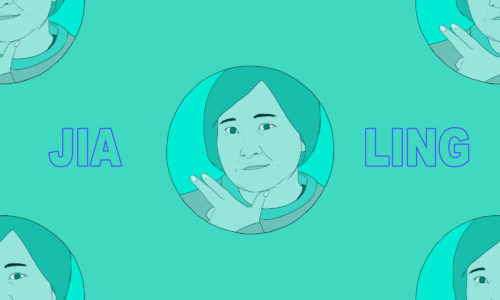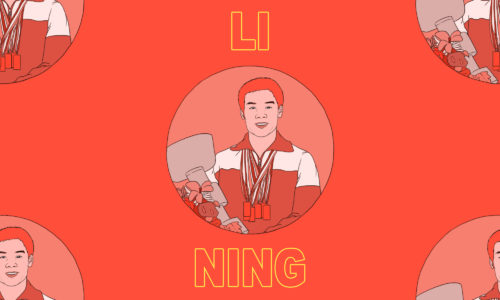The Chinese version of Hell (地狱 dìyù) fuses a familiar fiery inferno with dusty office paperwork. According to Journey to the West, beyond a gigantic dark mountain populated by goblins, trolls, and cave-dwelling feral spirits lay the court of Yama, King of Hell, a formidable presence but easily tricked by under-secretaries who tweaked death dates in his ledgers of life. Beyond him lay a system that grafted Buddhism’s “18 Layers of Hell” onto the systematic Daoist legend of the “10 Courts of Hell,” ruled over by 10 kings. Thus Armageddon was given order, demonic tortures well-categorized — “The Hell of the Mountain of Knives,” “The Oil Cauldron Hell,” “The Tongue Extraction Hell,” etc. You can almost imagine the names written meticulously on little plaques, while behind closed doors, “skin and flesh [are] ripped and torn, / Lips rubbed away till the teeth show.”
This diabolical system had one crumb of comfort, in the form of an old woman and a bowl of soup. The Goddess of Forgetfulness, Mèng Pó 孟婆, gives souls a draft of her special “Mi Hun Tang” (“soul beguiling soup”). All memories of past lives and hellish torment are swept into oblivion, turning each person into a clean slate, ready to be reincarnated.
Some in the West may see this as a horrific fate, but Meng Po (literally “Lady Meng”) is a reassuring presence in China, many welcoming her proffered bowl rather than rejecting it.
Who is Meng Po?
Who knows. She could be the grief-stricken soul of Lady Meng Jiang (孟姜女 Mèng Jiāng Nǚ), a wife who saw her husband off as a conscript to the Great Wall and later arrived there to discover he had died, her emotions causing part of the wall to collapse, revealing the bones of her unfortunate spouse.
Others think she was a forlorn spirit who couldn’t forget her life and loved ones on Earth, brewing her potion to ensure no one shares her fate. The Qing tome The Jade Guidebook (玉历宝钞 yù lì bǎo chāo, the standard Daoist text on the Underworld) says she was a devout Buddhist hermit who spent her days in the hills studying the scriptures “until she became unaware of what was past, / And had no care about the future.”
Although today she appears as a wizened old hag, the Guidebook sketches her as 81 and “though her hair was white, her complexion was clear as a child’s.”
But we can be sure she arrived in China around the same time as Buddhism in the 1st century AD, given her role in reincarnation. There she stands, waiting for all, with her ladle outstretched, containing a soup which the Guidebook warns is at once sweet, bitter, acrid, sour, and salty. It’s either prepared from a fountain of tears or with the water from a nearby stream, stewed with a selection of special herbs.
In the Guidebook she works within the bureaucracy, sitting enthroned on “The Terrace of Drunken Oblivion,” to whom demons usher souls one by one from a long queue, cups at the ready. But in the most popular takes she’s a rogue freelancer: since the late Qing, she’s been a lone figure parked beside the perilous Naihe Bridge (奈何桥 Nàihé qiáo). Journey to the West says, “The bridge is many miles long, / And only three fingers wide,” no railings to guard those crossing from a drop of a hundred feet into the foul-smelling river of blood below. Those who had been virtuous were permitted to cross on a higher tier, while the bad crossed lower down, harried by trolls, copper snakes, and iron dogs; those who fell would never be reincarnated.
Navigating such a bridge after drinking a mind-erasing potion seems unwise. But Chinese cherish Meng Po’s ability to remove all the bad memories a soul might possess, giving little thought to skills wiped or knowledge of loved ones lost forever. Weibo users talk of visiting her or drinking the soup in the wake of a traumatic event (like fighting COVID on the front lines). No matter what happens in life, you’ll always end up back in front of the same woman, who’s kept a bowl of hot soup waiting for you. A sip is all it takes.
Is she good or bad? It depends on which story you read. In the Guidebook, woe betide those who refuse to drink, her demon helpers shackling them while a copper tube is thrust down their throat. But Qing writer Shen Qifeng writes in The Harmonious Frontier that lovers Ge Sheng and Lan Rui had their doses withheld so they could find each other in their next lives. This seems to have happened more than once: legends spoke of babies talking as soon as they left the womb, having avoided their dose of Meng Po’s soup. Only she would know if this was by mistake or design.
Perhaps her recipe isn’t 100%. Some explain instinctive attraction or hatred toward random strangers as repressed memories of them from a previous life, straining to get through Meng Po’s oblivion. And besides, netizens have worked out it would be fairly easy to trick Meng Po with a taste of her own medicine. One online joke goes: “Meng Po ladled a spoonful of soup, tasted it and smiled with satisfaction…Meng Po ladled a spoonful of soup, tasted it and smiled with satisfaction…Meng Po ladled a spoonful of soup, tasted it and smiled with satisfaction…Meng Po ladled a spoonful of soup, tasted it and smiled with satisfaction…”
But instead, it’s mortal souls who are forever tasting and re-tasting her bittersweet brew.
Chinese Lives is a weekly series.






